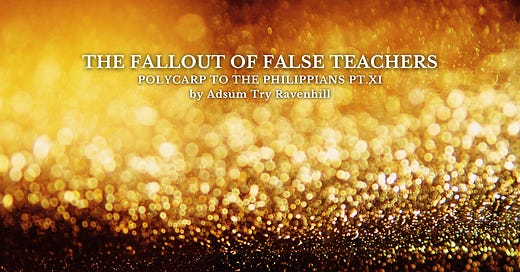This series on Polycarp’s letter to the Philippians was born out of a shared love that Tim and I have for the early church, but also a shared love for the church in our time. If you’ve missed the Polycarp series so far and you’d like to read along with us, you can do so by heading to this link, where you’ll find all of the articles we’ve written so far. Each of these articles is written in the form of a letter, either to Tim or myself . If you want to read more of Tim’s work, which I highly suggest you do, you can do so by heading to nuakh.uk.
Dear Tim,
Thank you again for your encouragement, especially your explanation of why I am, in fact, a cow. I’m grateful to get to cherish brothers and sisters in Christ as you wrote about, something our conversation yesterday illustrated perfectly. I’m praying for you and for Mrs S; thank you for trusting me to do so.
Whenever I talk about this series of letters, I start with our shared love for the early church, and for the church in our day. It pains me then that I have to talk today about a false teacher, Valens, who had recently been excommunicated at the time of Polycarp’s letter. As Polycarp puts it:
I am greatly grieved for Valens, who was once a presbyter among you, because he so little understands the place that was given him [in the Church].
Wherever lambs of the Lord are, there are wolves waiting to pounce. There are, of course, some sheep who cry wolf too quickly, but the danger is a very real one nonetheless. Valens wasn’t the first, and you and I know well that he wasn’t the last. Polycarp, true to his training and in step with the Spirit, gives us more than just a description of events to learn from in this passage, though. He once again exhorts the church in Philippi—and by extension the church in the UK—to seek to live virtuously, humbly, and to extend forgiveness even in the face of falsehood and deceit.
I think in this case it would be better for me to break up the passage as we go, and look at each section in detail.
Virtue
I exhort you, therefore, that you abstain from covetousness, and that you be chaste and truthful. “Abstain from every form of evil.” For if a man cannot govern himself in such matters, how shall he [exhort] others? If a man does not keep himself from covetousness, he shall be defiled by idolatry, and shall be judged as one of the heathen.
The floods came months ago now, but they still haven’t fully dissipated. In fact, it’s like we have ten new ponds behind our house, all vying for territory. Each rainfall changes the landscape a bit more, with no sign of stopping. The floods have changed other things too, the wildlife has changed; the plants are richer and there’s far more of them. Strangest of all, the air smells like the sea.
False teachers come one drop at a time, changing the landscape of the church and as a result—even long after the initial effects have worn off—those who sat under the teaching are bound to have been affected. One effect is the potential for temptation to gain a foothold, and for sin to creep in. For those who sat under Valen’s teaching—and may well have received personal counsel against their own sin from him—they might now be tempted to conform to the flesh, rather than the Spirit.
Polycarp has likely seen this all too often in his capacity as an overseer in the early church, and so for those of us who find ourself in the same place as the Philippians, we’d do well to heed his counsel. These sins and idols that Polycarp warns against can take many forms, but the two that come to mind are pride and envy. Our hearts might make statements like, “thank goodness I’m nothing like Valens” or ask questions like, “why wasn’t I given that position instead?” We’d do well in times like these to remember that righteousness doesn’t come from ourselves, but the Spirit. If we cannot govern ourselves, according to the Spirit, then we have no right to exhort others either, just like Valens.
A few years ago at a conference, I bumped into a friend at the bookstore. He has just made a purchase and so I asked him what he’d bought. This friend is a pastor of some twenty years, and his humility that day showed me why. It was a book on adultery. I don’t remember the exact title, but it wasn’t a theoretical or theological book, it was a pastoral one, aimed at helping pastors not to cheat. He wasn’t hesitant, he didn’t try and hide it from me, he just handed it over. I thanked him for being so honest and asked him some follow up questions. I’ll never forget what he told me.
“I don’t think I’m in any danger of cheating, but that’s the danger in itself. I never want to think I’m above anything, because I still sin, and so I thought I’d buy this to safeguard against it.”
If only we all had such humility, honesty, and awareness of our own depravity.
Lord, make us so.
Humility
Polycarp wants us to understand how important this humility is. Judgement is coming, and we can either hide behind excuses and point at the false teachers who gave them to us, or run the to cross and accept the robes that were purchased there.
He says:
But who of us are ignorant of the judgment of the Lord? “Do we not know that the saints shall judge the world?” as Paul teaches. But I have neither seen nor heard of any such thing among you, in the midst of whom the blessed Paul laboured, and who are commended in the beginning of his Epistle. For he boasts of you in all those Churches which alone then knew the Lord; but we [of Smyrna] had not yet known Him.
Polycarp’s people hadn’t come to know the Lord in Paul’s day, and so, Polycarp writes here as a younger brother encouraging his elder brother. Just like that pastor, he knows of no impropriety in the Philippians, but he knows it’s possible.
Our faith and the faithful around us were spiritually born long after this, but still share the same inheritance. Let’s not be ignorant of the judgement of the Lord. False teachers will come and go, but the final judgement isn’t for us to decide, that right belongs only to the Lord1. We don’t know what is yet to come for them, either they will answer for their sins, or they will one day cast their sins and sorrows upon Jesus once and for all. Either way, justice will come. Until then, we are to be watchful. Watchful over our own hearts, and minds, and people, and also watching in hope that those who were once wolves will become lambs one day.
As Polycarp goes on to say:
I am deeply grieved, therefore, brothers, for him (Valens) and his wife; to whom may the Lord grant true repentance! And be you then moderate in regard to this matter, and “do not count such as enemies,” but call them back as suffering and straying members, that you may save your whole body. For by so acting you shall edify yourselves.
This is perhaps the hardest exhortation in the whole letter. The news cycle is full of the accounts of wolves, with their sins written up on banners and left to hang on the wall of the internet forever. I’ve been off of Twitter now for just a few weeks and it was one of the first things I noticed. I haven’t seen any news of yet another fallen leader in the church, and it is refreshing to say the least.
It is right that we hope for justice in the face of these reports, but we should be careful not to pick up pitchforks and selfishly take that justice into our own hands2. We need to trust that the Lord who was able to forgive our sins can forgive theirs too, and we should hope for that outcome. Every sinner who enters the church has hurt people in their past, and yet, we preach forgiveness, that shouldn’t change just because they hurt people within the church.3
This was a heavy passage, and one that I could write far more on, but I will say this. I hope that if Valens truly repented of his sin after this letter arrived, that the Philippians took Polycarp’s advice, humbly forgiving him, and allowing him back into the fold, with wisdom and with care.
I hope the church in our day will do the same.
Grace and Peace,
Adsum Try Ravenhill
lthough we do need to hold teachers to biblical standards, and judge correctly whether or not to install them, or keep them in office.
This isn’t to say that civil justice isn’t ever an option, to be clear. Some false teachers extend the borders of their sin to make room for crimes that do require further investigation and sentencing, but this isn’t always the case.
Polycarp doesn’t suggest that these once leaders come back into the fold in that same capacity, but, grieved by their sin, calls upon the church to accept them as members.







